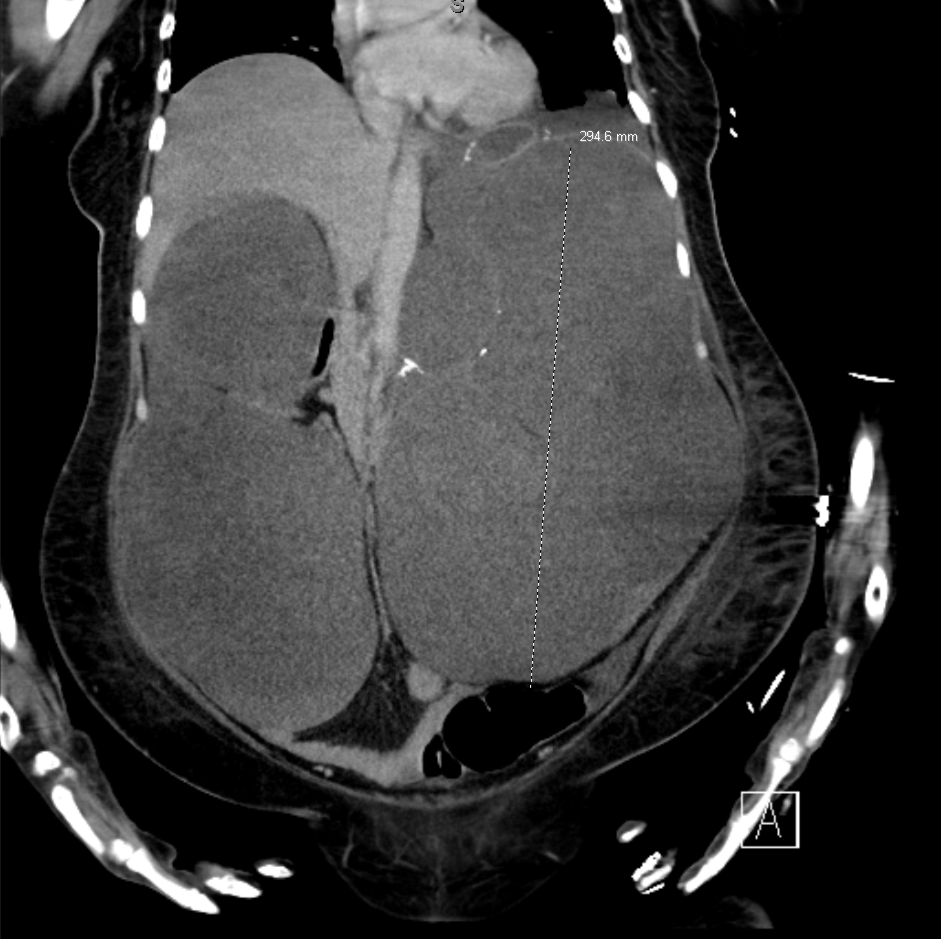Monday Poster Session
Category: Colon
P2507 - Beyond Obstruction: Gastrointestinal Compromise in Recurrent Dedifferentiated Retroperitoneal Liposarcoma
Monday, October 27, 2025
10:30 AM - 4:00 PM PDT
Location: Exhibit Hall

Anjo Chacko, MD
Broward Health North
Coral Springs, FL
Presenting Author(s)
Anjo Chacko, MD1, Anish Iyer, DO2, Keshavi Mahesh, MD3, Aryama Sharma, MD2
1Broward Health North, Coral Springs, FL; 2Broward Health North, Deerfield Beach, FL; 3Broward Health North, Pompano Beach, FL
Introduction: Dedifferentiated retroperitoneal liposarcoma (DDLPS) is a rare, aggressive malignancy with a high rate of local recurrence. Gastrointestinal (GI) symptoms typically result from mass effect, obstruction, or invasion. While bowel obstruction is well documented, severe GI intolerance and intractable abdominal pain without frank obstruction are less frequently reported. We present such a case to highlight the importance of early GI-focused palliative care.
Case Description/
Methods: A 37-year-old woman with no prior medical history presented in November 2023 with progressive abdominal pain. Imaging revealed two left retroperitoneal masses (15 cm and 8 cm) compressing adjacent structures. She underwent extensive resection: mass excision, left nephrectomy, splenectomy, distal pancreatectomy, and vascular ligation. Pathology confirmed DDLPS with low mitotic activity. No adjuvant therapy was administered. She was lost to follow-up due to lack of insurance. She re-presented in August 2024 with worsening abdominal pain, weight loss, and MRI evidence of local recurrence (10.6 × 7.3 × 4.4 cm). Biopsy confirmed DDLPS. Although chemotherapy was planned, treatment was delayed due to insurance and residency barriers. Pazopanib was prescribed but never obtained. Her condition deteriorated with intractable pain, vomiting, and cachexia. CT in January 2025 showed bilateral retroperitoneal tumors >30 cm compressing intra-abdominal organs. She became unable to tolerate oral intake and required escalating opioids. With declining functional status and lack of treatment access, she was transitioned to hospice care.
Discussion: This case illustrates profound GI dysfunction from tumor compression without true luminal obstruction. Mass effect alone can severely impair GI motility, intake, and symptom burden. Current systemic therapies offer limited relief in high-volume disease. Earlier palliative care—focused on symptom control, nutrition, and quality of life—may improve outcomes in similar patients. This case also highlights disparities in care access that can worsen clinical trajectories. Further research is needed to define mechanisms of non-obstructive GI compromise in retroperitoneal tumors and guide evidence-based palliative strategies.

Figure: Figure 1. Coronal CT abdomen/pelvis image demonstrating massive bilateral abdominal tumors compressing intra-abdominal organs.
Disclosures:
Anjo Chacko indicated no relevant financial relationships.
Anish Iyer indicated no relevant financial relationships.
Keshavi Mahesh indicated no relevant financial relationships.
Aryama Sharma indicated no relevant financial relationships.
Anjo Chacko, MD1, Anish Iyer, DO2, Keshavi Mahesh, MD3, Aryama Sharma, MD2. P2507 - Beyond Obstruction: Gastrointestinal Compromise in Recurrent Dedifferentiated Retroperitoneal Liposarcoma, ACG 2025 Annual Scientific Meeting Abstracts. Phoenix, AZ: American College of Gastroenterology.
1Broward Health North, Coral Springs, FL; 2Broward Health North, Deerfield Beach, FL; 3Broward Health North, Pompano Beach, FL
Introduction: Dedifferentiated retroperitoneal liposarcoma (DDLPS) is a rare, aggressive malignancy with a high rate of local recurrence. Gastrointestinal (GI) symptoms typically result from mass effect, obstruction, or invasion. While bowel obstruction is well documented, severe GI intolerance and intractable abdominal pain without frank obstruction are less frequently reported. We present such a case to highlight the importance of early GI-focused palliative care.
Case Description/
Methods: A 37-year-old woman with no prior medical history presented in November 2023 with progressive abdominal pain. Imaging revealed two left retroperitoneal masses (15 cm and 8 cm) compressing adjacent structures. She underwent extensive resection: mass excision, left nephrectomy, splenectomy, distal pancreatectomy, and vascular ligation. Pathology confirmed DDLPS with low mitotic activity. No adjuvant therapy was administered. She was lost to follow-up due to lack of insurance. She re-presented in August 2024 with worsening abdominal pain, weight loss, and MRI evidence of local recurrence (10.6 × 7.3 × 4.4 cm). Biopsy confirmed DDLPS. Although chemotherapy was planned, treatment was delayed due to insurance and residency barriers. Pazopanib was prescribed but never obtained. Her condition deteriorated with intractable pain, vomiting, and cachexia. CT in January 2025 showed bilateral retroperitoneal tumors >30 cm compressing intra-abdominal organs. She became unable to tolerate oral intake and required escalating opioids. With declining functional status and lack of treatment access, she was transitioned to hospice care.
Discussion: This case illustrates profound GI dysfunction from tumor compression without true luminal obstruction. Mass effect alone can severely impair GI motility, intake, and symptom burden. Current systemic therapies offer limited relief in high-volume disease. Earlier palliative care—focused on symptom control, nutrition, and quality of life—may improve outcomes in similar patients. This case also highlights disparities in care access that can worsen clinical trajectories. Further research is needed to define mechanisms of non-obstructive GI compromise in retroperitoneal tumors and guide evidence-based palliative strategies.

Figure: Figure 1. Coronal CT abdomen/pelvis image demonstrating massive bilateral abdominal tumors compressing intra-abdominal organs.
Disclosures:
Anjo Chacko indicated no relevant financial relationships.
Anish Iyer indicated no relevant financial relationships.
Keshavi Mahesh indicated no relevant financial relationships.
Aryama Sharma indicated no relevant financial relationships.
Anjo Chacko, MD1, Anish Iyer, DO2, Keshavi Mahesh, MD3, Aryama Sharma, MD2. P2507 - Beyond Obstruction: Gastrointestinal Compromise in Recurrent Dedifferentiated Retroperitoneal Liposarcoma, ACG 2025 Annual Scientific Meeting Abstracts. Phoenix, AZ: American College of Gastroenterology.
